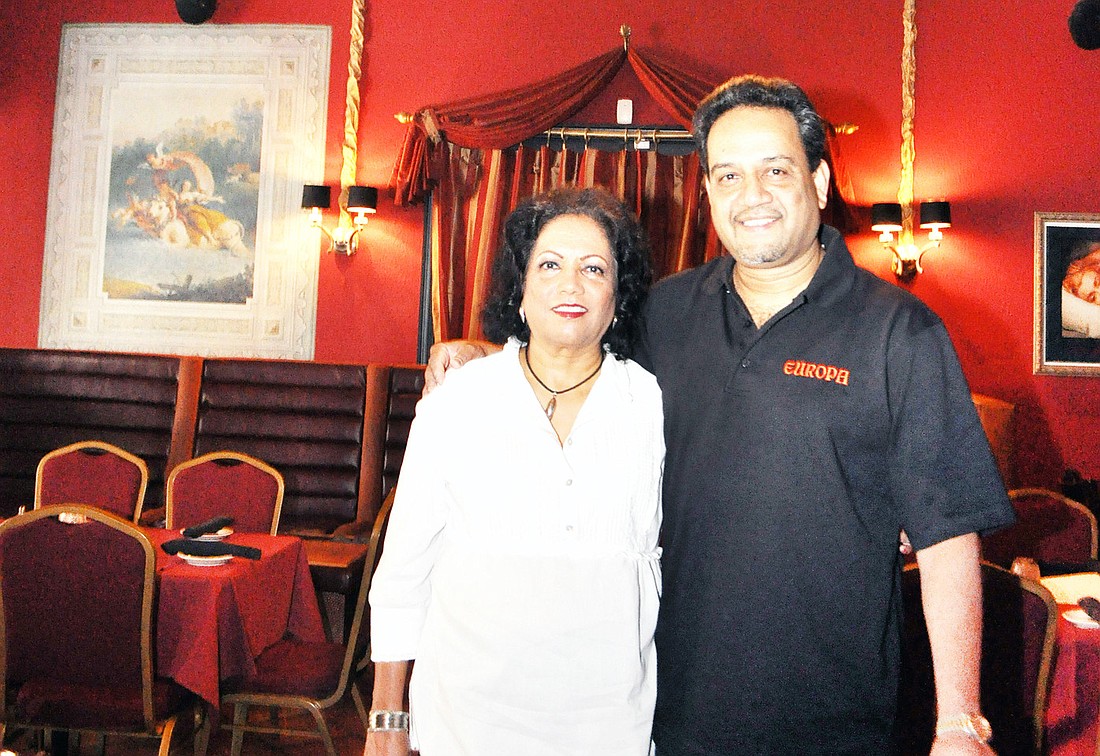- November 23, 2024
-
-
Loading

Loading

Since the economic collapse, Ambroz Ferrena and Alida Ferrena have found creative ways to reinvent their restaurant.
Europa Lounge & Bistro at the European Village has expanded its Indian menu by about 20 selections, marking yet another step in the 6-year-old restaurant’s push for reinvention since the market collapse.
“We were faced with two options,” Europa Manager Ambroz Ferrena said: “Shut the doors and walk away, or dig in our heels.”
They chose the latter.
Ferrena and his sister, Alida Ferrena (who co-owns Europa with Ambroz’s wife), went into business in 2005, and their goal was simple. The economy was flourishing, and they planned to buy property in the entrance to the European Village, then flip it. Contractually, though, they had to operate in the space for at least a year before reselling.
Neither had any experience in food service, but Alida worked as an auditing chief for the United Nations and a lobbyist for Namibian independence. Ambroz was a pharmaceutical consultant. How hard could it be to run a restaurant? they wondered.
With a connected entrance to the village’s lobby, Europa was the exclusive food/liquor proprietor of the resort. Starting as a high-end piano bar, it eventually expanded to a French restaurant and lounge.
Business was booming.
Then, two years after opening, the developer/resort operator who partnered with them went bankrupt. The economy collapsed. The adjoining lobby closed, and entertainment in the courtyard dried up. Neighboring businesses began pulling out of the complex.
That’s when the Ferrenas were forced to get creative.
“Suddenly, we found ourselves with a very expensive high-end place, and no one (around) who could afford it,” Ambroz Ferrena said. “The change came to us, instead of us effectuating the change … (So) we adjusted our techniques … and our product … and I think we have it now.”
Switching from the French, chef-centric model, the Ferrenas, who were born in Bombay and also have Italian and Asian heritage, made their menu international.
Now, Europa is tri-cultural, described as “mom’s home-cooking” American, Indian and Asian cuisine.
Its ambience reflects the menu’s eclecticism. Draped on the ceiling of the dining room, over maroon walls, chandeliers, a photo of Alida Ferrena with the former Pope (whom she’s met three times) and a London phone booth, is Indian-style gold cloth. The bar is a monument of silver chrome and Sensitile — a fiber optic exterior with neon lights sparkling throughout. They had it built by an innovator featured in TIME magazine.
“It’s kind of a little funky, artsty, upscale, but at the same time not stuffy,” Ambroz Ferrena said. “And you can have a meal for under $10.”
The two decorated the space independently.
“I’m so proud of this … I can see it dripping out of me,” said Alida Ferrena, who put together the Indian menu. She says she’s always understood the “technical, scientific” side of cooking, but never put the concepts into practice until entering the restaurant business. Now, she leads the kitchen staff.
“First, my challenge was getting independence for the country of Namibia. Now, this work is almost harder!” she joked.
Ambroz Ferrena, who says he was initially afraid to touch a glass and used to hide when customers had questions about the food, is now head bartender and embraces patrons’ feedback.
“I’m amazed in myself that I can do this, “Alida said. “Necessity is the mother of invention.”
And they know it will take further invention to outlast the remainder of the economic drought. But after six years in business, the two feel ready for the challenge.
“It’s a microcosm of the rest of the country and the city.” Ambroz Ferrena said of the European Village, which is currently at 70% capacity. There’s a lot of struggle, a lot of adaptation. A lot of stores haven’t made it. But many are surviving.
“Each individual business that has survived here in these last six years — it’s a heroic tale of staying live in a place that did not turn out the way (that we expected),” he said.